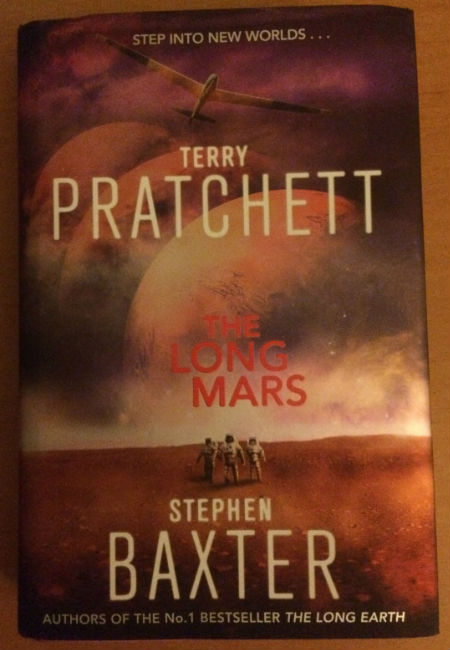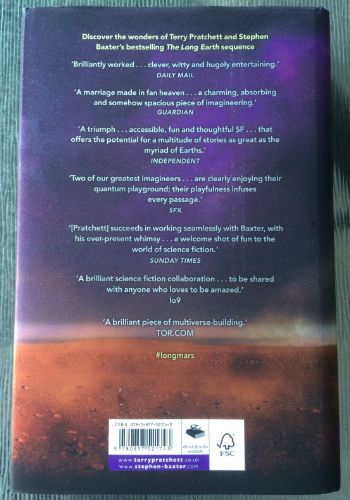If there is one thing that defines humanity, it is our capacity for optimism, the seemingly endless capacity we possess for believing that despite all the wars, repressive regimes, famine and natural disasters, poverty and starvation, and whole host of other societal and personal demons too numerous to mention, that life can get better.
To some it is the wishfulness of the fool but for most of us, it is an innate sense that the glass really is half full, that possibility waits just around the next corner if we are just alert enough to recognise it.
It is that inbred ability to keep tenaciously pushing forward when common sense might dictate we retire to a remote backwoods cabin with all the wine we can carry and a good stash of paperbacks that fuels the citizens of the Long Earth in 2045, millions upon millions of alternate versions of our home planet all linked together like a cosmic daisy chain that were opened up to the beleaguered citizens thirty years earlier on what was quickly called Step Day.
Freed from the constraints of living on what is now known as Datum Earth, humanity quickly spread through to the Low Earths, the iterations of our homeworld just a few steps away from our own, then into the far reaches of these endless Terran carbon copies, buoyed by the idea that here was a second-chance, new resources, supplies, possibilities.
First detailed by Stephen Baxter and Terry Pratchett in The Long Earth (2012) and continued in The Long War (2013), The Long Mars continues the story of the Long Earth, a series which confirms that along with our capacity for idealistic optimism and wonder, and there is a great deal of this in the third volume in the series from these two talented authors, come the lesser angels of our nature, the dirtier, grubbier, less praiseworthy aspects of our collective being that left unchecked can rob us of any advantages gained from our more enobling traits.
For all of the momentous discoveries on the long Mars by natural “Stepper” Sally Linsay, her father Willis and astronaut Frank Woods, our planetary neighbour’s equivalent of the multiple earths, all of which are described with palpable and excitement by Baxter and Pratchett, and all of which promise advances untold and wonders unrivalled, humanity remains mired in petty paranoia and fear, specifically of the Next, a super-intelligent race of human beings with their genesis in the far reaches of the long earths who make their presence felt rather profoundly.
As much as The Long Mars concerns itself with the beautifully-articulated unique wonders of the multiple stepwise earths journeyed through by US navy commander Margie Kauffman, and the selflessness of the people who rescue millions to the Low Earths when the Yellowstone volcano on Datum Earth explodes and renders much of the northern hemisphere unliveable, it is also very much aware that new locations do not have a completely new flaw-free humanity make.
Hence humanity reacts with fear and torches and pitchforks to the arrival of the Next, and Lobsang, an AI presence and supposedly the re-incarnated intelligence and soul of a Tibetan mechanic, and multi-billionaire Douglas Black, while ostensibly facilitating humanity’s re-invention as a multi-planet species, have suspect agendas of their own.
In that respect, The Long Mars is a clever novel, full of interesting ideas, and deep philosophical questions about the nature of humanity and its potential, as well as the sort of giddy, breathless enthusiasm for the ability of science and nature to surprise and delight us that would not be out of place on a National Geographic documentary.
Where The Long Mars falls down is in its fashioning of a well-flowing narrative that would comprehensively unite the sometimes one note characters populating its pages.
While there is graphically descriptive, astoundingly creative world building aplenty and and the constituent stories work well in and of themselves, there is never any sense of everything being stitched together into some monumental whole.
The threads never quite tie up, save for a belated gathering of the main characters in one room in the small, almost after thought epilogue which, though mildly rewarding and the set up for what I presume in the next entry in the series, never really compensates for the often discursive storytelling up to that point.
It’s not a fatal flaw, for The Long Mars has enough wonder, and suspense and enthusiasm for life and its infinite possibilities and variations and hence readability to keep you turning the pages, but these narrative shortcomings detract from all the effort the authors have clearly gone to make to make the long Earths and the Long Mars places of true wonder and possibility and somewhere you are more than happy to spend some time lost in the optimism which defines us all to one degree or another.

